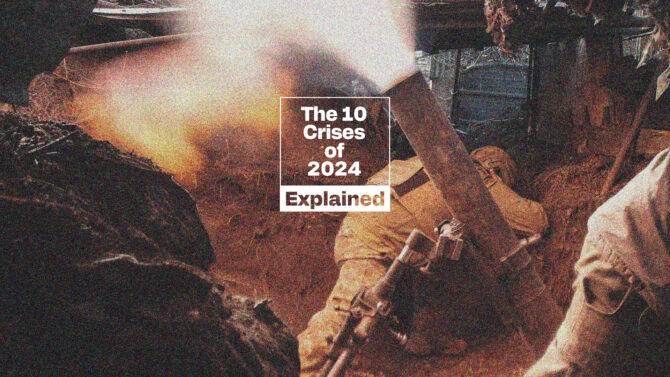In the tenth – and final – installment of the “10 Crises of 2024” series, iMEdD explores the competition between the two superpowers of our time: US and China. What are the main parameters of the tension between Washington and Beijing? How has the trade war between the two evolved? In which regions of the world do the countries with the largest military expenditures meet, and how will the November US elections affect the situation?
9. Ukraine: The latest developments and what comes next

The 10 crises of 2024 – Explained: 9.
When did the US-China trade war start?
The trade war between the US and China is an economic conflict that started in July 2018, under the presidencies of Donald Trump and Xi Jinping respectively. Washington began setting tariffs and other trade barriers on Chinese products, accusing Beijing of unfair trade practices and intellectual property theft.
How has it evolved over the years?
China responded with its own trade restrictions on U.S. products, while characterising U.S. actions as a means of suppressing its economic growth. In 2018, the US imposed three different rounds of tariffs, followed by a fourth in September 2019. In January 2020, the two sides signed a deal aimed at easing the trade war. Under this agreement, Beijing pledged to increase imports of US goods and crack down on the underground economy and intellectual property theft, while the US halved some of the trade tariffs it had imposed. Nevertheless, both sides maintained active trade barriers and restrictions on the free movement of goods. It is estimated that despite the agreement, tariffs remained in place on about $360 billion of Chinese goods and more than $100 billion worth of U.S. exports.
The January deal did not yield the results expected and was labelled a “historic failure” because, two years after the agreement, China had bought less than 60% of the US exports it had committed to purchasing.
During Joe Biden’s tenure, many of the tariffs enforced by Trump remained in place. In fact, in May 2024, he imposed significant new tariffs on Chinese products such as electric vehicles, batteries, steel, aluminium and medical equipment, citing unfair trade practices and protection of American businesses, thus increasing friction between the world’s two largest economies.
Beyond the economy?
Beyond economic tension, the US and China compete on a broader geopolitical and strategic plane. According to the SIPRI report, in 2023, the US and China were the world’s largest military spenders, and both had increased their spending compared to the previous year. Tensions between Beijing and Washington appear to be escalating over Taiwan and the recent election of President Lai Ching-te in Taipei. Strategic competition has also been growing in the South China Sea region over the past 10-15 years. China is expanding its influence through investments and lending in Africa, particularly in regions such as the Sahel, leading to conflicts with US interests there. Additionally, Beijing also seems interested in active military conflicts, such as those in Myanmar, where China is reportedly aiding the government while the US backs resistance groups, and in Ukraine, where Beijing is allegedly supporting the Russian economy against Western sanctions.
What role will the US elections play?
The November elections in the US are expected to be of crucial importance for the continuation of US-Sino relations. Biden and Trump appear to be competing in the run-up to the election over who will impose the toughest tariffs on Chinese products, with Trump pledging 60% tariffs against all Chinese products and 10% against products from the rest of the world if elected. According to an analysis by the Peterson Institute for International Economics, if such measures are implemented, there is a risk of a global trade war. On a recent trip to China, US Secretary of State Antony Blinken said Washington has seen evidence of Beijing’s attempts to interfere with and influence the November election. In April 2024, Reuters reported that US relations with China are likely to worsen regardless of who wins the White House seat. Three months ago, in January, AP claimed that China has no particular preference for either candidate, and that the outcome of the election could have huge consequences not only for US-China relations but also for peace and stability in Asia and the Pacific Ocean.
Read all the Explainer texts of the series “The 10 Crises of 2024” here.
